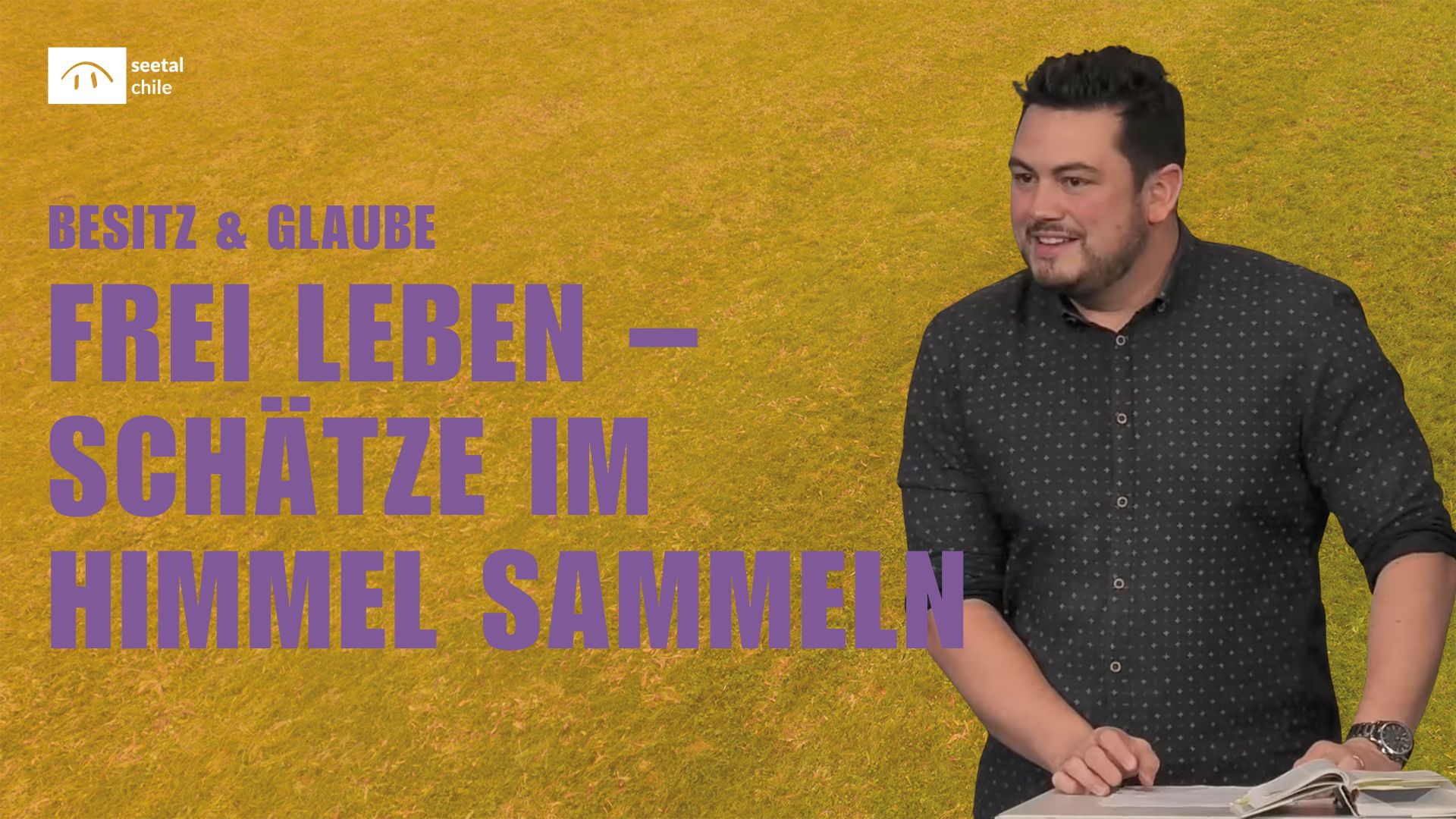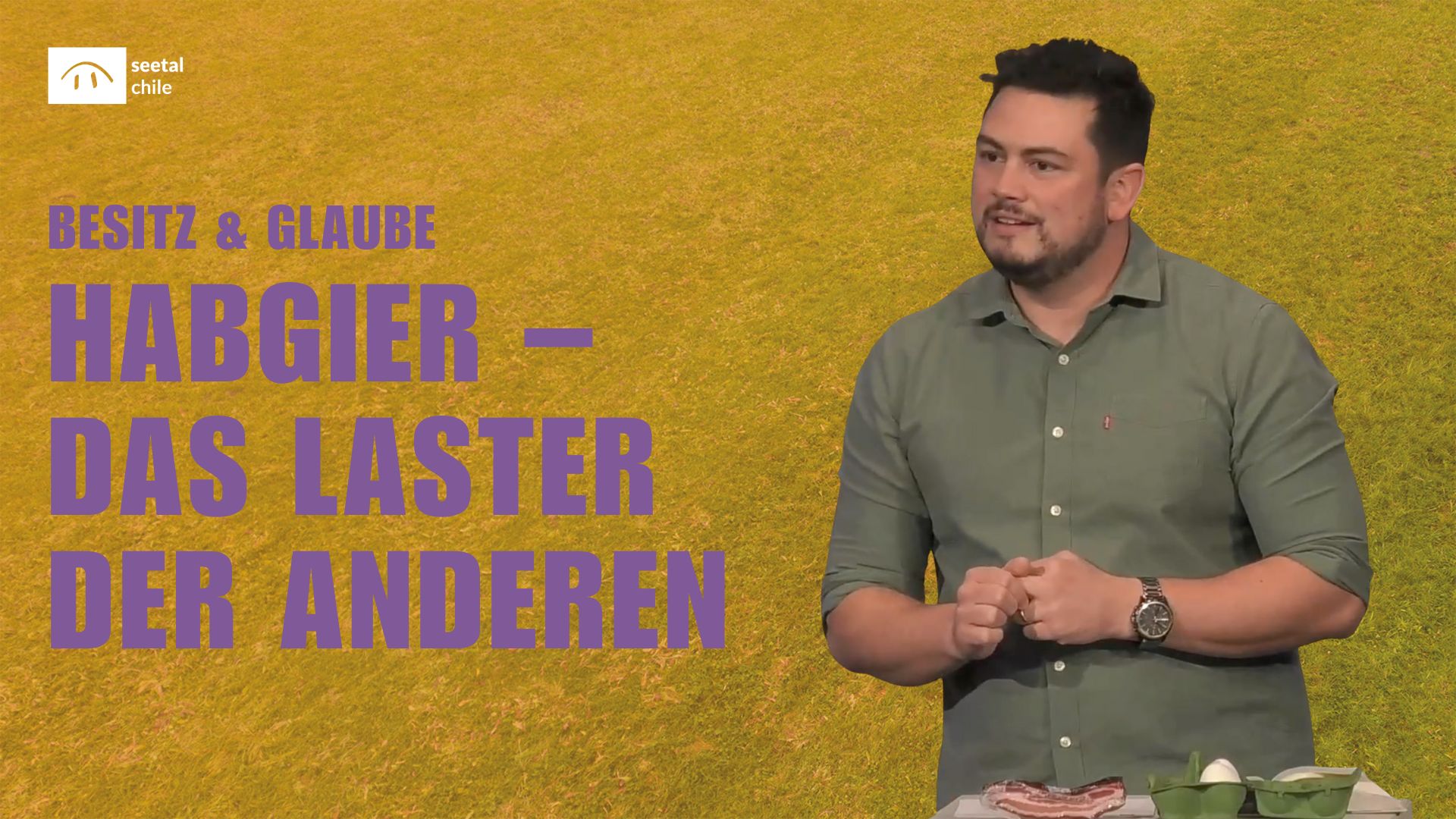Possession & Faith | Giving makes you happier than receiving!
Series: EIFACH muetig – with Jesus as a role model | Bible text: 2 Corinthians 8:9; Luke 19:1–10
Our possessions can easily take us captive. That’s why it helps to adopt principles that constantly remind us to worship God and not our possessions. One such principle is tithing – giving ten per cent of your income back to God. Behind this is a changed heart that finds security and fulfilment not in possessions, but in trusting God. A good orientation is to invest the tithe in such a way that it contributes to the spread of God’s kingdom and/or combats poverty in the world.
We humans all follow someone or something. The Bible calls this either God or an idol. We hope to gain security, recognition and relevance from this and subordinate everything accordingly. Of all the possibilities, possessions are very suitable as idols.
The principle of the tithe
Money gives us importance. When we feel superior, we don’t say: «I’m financially above you.» But we feel better when we have more because money gives us security. Money gives us control in an uncontrollable world. But Jesus says that chasing after possessions can’t give us control – it leads to worrying about them: «Stop worrying about your food and drink or your clothes. Why do you want to live like people who don’t know God and take these things so seriously? Your heavenly Father knows your needs. Make the kingdom of God your most important concern, live in God’s righteousness and he will give you everything you need» (Matthew 6:31–33 NLB). Jesus says this a few verses after realising that people cannot serve God and possessions (Matthew 6:24). All people are in this danger of making possessions an idol – either because they set their hearts on their abundance, or because they set their hearts on the little they have.
It therefore helps to establish principles in the area of ownership. Such a guideline helps to ensure that not everything has to be renegotiated again and again. It gives our heart a framework. We thus curtail the tendency of our heart to always want more and/or to worry. A good, very old and proven principle is the tithe. This says that I give a tenth of my income back to God. So here are a few thoughts on this.
In the Bible, we read the story of Jacob. He fled from his brother to his relatives and God met him. God promised him that he would be with him. Jacob responded out of this gratitude: «Jacob then made the following vow: «If God is with me, protects me on my journey and gives me food and clothing, and if I return safely to my family, then he shall be my God. In the place where I have placed the memorial stone, there shall be the house of God. I will give you a tenth of everything you give me» » (Genesis 28:20–22 NLB). When God gives him protection, food, clothing and a reunion with his family, he gives him a tenth back. He doesn’t see much as necessary for him to be grateful to God. But his view is exciting. What does he give a tenth of? Of what God gives him! If we don’t recognise that God gives us everything, then it is difficult to be grateful and give something back. This is also based on the idea that I am responsible for myself, but also that I can trust God less than I can trust myself. Our handling of possessions says a lot about our spiritual life!
The Israelites gave their firstfruits. The first thing that grew in the field was given directly back to God. It is a sign of trust that there is more to come. God wants everything from Israel. As the Creator, everything belongs to him. That is why they gave the best to him – the first part, not just at the end or on the way, but to give something back to God at the beginning. Because possessions are not dangerous, but trusting in them is. That was not easy for the people either. But God invites his people to put their trust and God to the test: « «Bring the entire tenth part of your harvest into the storehouse so that there will be enough food in my temple. Put me to the test,» says the Lord Almighty, «to see if I will not open the windows of heaven for you and shower you with countless blessings!» (Malachi 3:10 NLB). Trusting in God pays off – not materially, but in blessings. For example, possessions become less important to me, my identity no longer depends on my social status, etc.
We cannot serve God and money (Matthew 6:24). Therefore, tithing is a touchstone for my trust in God. The discussion about whether my gross or net income should be tithed actually already shows what is important to my heart. It is not just a question of whether I trust God, but the focus on my possessions clouds my vision: «Because where your wealth is, there is also your heart. Your eye is the window of your body. A clear eye lets the light penetrate into your soul» (Matthew 6:21–22 NLB). Of course, there is a difference between earning CHF 10,000 and giving a tenth and having to make do with CHF 3,500. If it’s not a priority for a small income, then it’s not a priority for a large one either. Next Sunday it’s all about the remaining 90 %. But this much already today: If you don’t give enough money, that it limits you, that it is a sacrifice, if it doesn’t affect your lifestyle and makes no difference to how you live your life, then it is not an answer to how Jesus Christ sacrificed his life for you on the cross. How much should I give away? Jesus is the standard – his cross. Last time we heard that it is impossible for people to enter God’s kingdom. But for God, everything is possible (Mark 10:17–31). Therefore, how I handle my possessions is a response to what Jesus Christ has done. Tithing is not a commandment, but a biblical principle that can help me do this.
Changed heart
The story from last time is an indication that it is more difficult for wealthy people to share in God’s kingdom. What lies behind being able to trust God even when dealing with possessions? A changed heart! In the text reading, we heard the story of Zacchaeus. He encountered God and it changed the way he handled his possessions. This encounter changed his heart. This also included restoration and reparation. He now followed a principle that he applied: He gave half of his possessions to the poor, and to those from whom he had taken too much, he wanted to repay them fourfold. This is more than just satisfaction. It is a sign of his changed relationship with God. He cares for the poor. Zacchaeus did not have to give everything away in order to follow Jesus. But his actions make it clear that his heart is no longer set on it. The story in Luke’s Gospel follows that of the rich young man from last Sunday. Zacchaeus undergoes an exciting conversion. «I must be a guest in your house today» becomes «Today this house has found salvation».
When people meet Jesus, they do the strangest things with their possessions: «Many people came to faith and confessed their sins. A number of them who had practised sorcery brought their books of spells and burned them. The books were worth fifty thousand pieces of silver» (Acts 19:18–19 NLB). One piece of silver equalled one day’s wages. Today, based on the median wage, this corresponds to around 16 million Swiss francs!
Not only did people do funny things – they also got an eye and love for the poor. This was already laid out in the Old Testament: «Don’t deny anyone the help they need if it’s in your power to do so. If you can help your neighbour immediately, don’t say: «Come back tomorrow and I’ll help you» » (Proverbs 3:27–28 NLB). And this is also continued in the New Testament: «All those who profess faith in Jesus Christ must learn to help where it is needed. Otherwise their faith will remain fruitless» (Titus 3:14 HFA). The goal of the changed heart is to come to the point where these people were – out of their relationship with Jesus: «You suffered with those who were in prison. When your possessions were taken away from you, you accepted it with joy, because you knew that you had something better that you would never lose» (Hebrews 10:34 NLB).
Everything is possible for God!
So what is the point of practising this biblical principle? To put it a little more broadly, it can be summarised as follows: «We limit the number of our possessions, expenses, occupations and social obligations so that we are free to live with joy in the Kingdom of Jesus» (John Mark Comer). Faith and the fight against poverty belong together. We warmly invite you to put this into practice with the Christmas parcel campaign. You can find more information on our blog. The important thing is: we change because we are accepted by Jesus Christ, not in order to be accepted!
My desire is for my life to reflect Jesus Christ in me. «You know the great love and grace of Jesus Christ our Lord. Although he was rich, he became poor for your sake, so that through his poverty he might make you rich» (2 Corinthians 8:9 NLB). What you spend your money on shows what is important to you. «Only when Jesus is your treasure are you truly rich, because he is the only currency that cannot be devalued» (Timothy Keller).
If the principle of tithing has appealed to you, the question arises: Where should I give this money? My suggestion: give to what your heart beats for. I have a deep connection to an Asian country, so we support Jesus followers there. As a family, seetal chile is our spiritual home. That’s why we give money here. My wife had a colleague who wanted to invite people for Jesus abroad and we supported her. Are you a sports enthusiast? Support organisations that support athletes and encourage them in their faith. Are you an aviation enthusiast? Support organisations that use planes to help people in inaccessible places. Do you like to eat? Support organisations that work to ensure that people have enough to eat. Do you like drinking alcohol? Support organisations that are committed to helping people and families who have less control than you. From my point of view, two principles are crucial: firstly, it helps to spread the good news of Jesus Christ, and secondly, it helps to fight injustice – especially poverty – in the world. Of course, it would be nice if the two things came together.
Possible questions for the small group
Read the Bible text: Luke 19:1–10
- What was your «What used to be your «life dream» – and has this dream changed in the course of your life of faith? What has shaped your view of success, possessions or life goals?
- Jesus says that we cannot serve God and our possessions (Matthew 6:24). At what moments do you realise that money or security plays a strong role in your thoughts or actions?
- The principle of tithing should help to detach our hearts from possessions. What experiences have you had with giving – financially, temporally or otherwise? How does giving influence your trust in God?
- Zacchaeus» encounter with Jesus radically changed the way he dealt with possessions. What could it mean today that «Jesus has changed my heart» – especially in dealing with money and consumption?
- «We limit the number of our possessions, expenses, occupations and social obligations so that we are free to live with joy in the Kingdom of Jesus» (John Mark Comer). What could this look like in your everyday life? Is there a step you would like to take this week to live more generously or freely?





